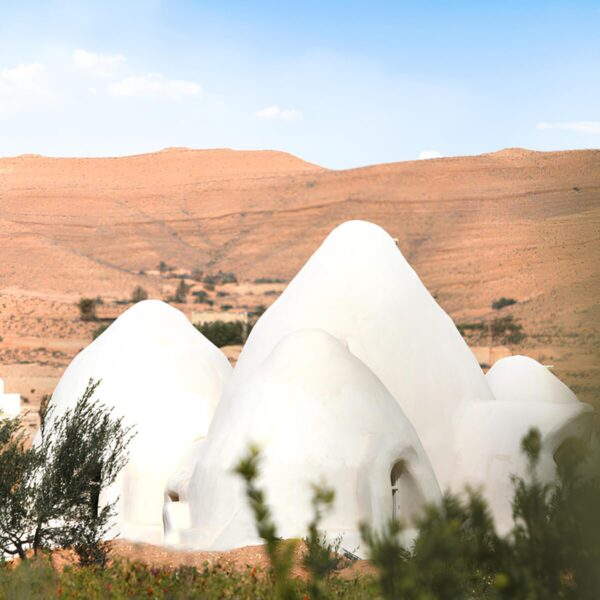Confronted with water stress affecting their country for years and rising temperatures, farmers are trying to vary their practices. This involves saving water and energy. Thus, in southern Tunisia, Radouane Tiss has recreated an entire system of biodiversity and permaculture in the oasis of his ancestors.
Energy and Agriculture # 1
Radouane Tiss, a former geography teacher, originally from Ghomrassen in southeastern Tunisia, was tired of talking to his students about climate change. “And that it remains just words.” “I wanted there to be reference models in Tunisia to give them something concrete,” emphasizes the one who, twenty years later, became a farmer and opened a eco-lodge in Oued El-khil, a small village in his region.
Learning Everything Again
The son of farmers, had to relearn everything when he inherited the family land in the middle of the desert, where only a few olive trees remained. The natural irrigation practiced by his predecessors was no longer sufficient in a region hit hard by various periods of drought. “I started in 2017 on a three-hectare plot. And I chose permaculture to respect the nature on site and live in harmony with it,” explains Radouane. To do this, he multiplied tutorials on the internet and training with the Tunisian Permaculture Association (which has supported both novice and experienced farmers in transitioning to more sustainable agriculture since its creation in 2015).
Ecotourism to Raise Awareness
After setting up his ecological farm, Radouane then ventured into ecotourism to raise awareness about his project. In the oasis where his farm is located, he planted thousands of trees to promote biodiversity instead of monoculture.
“I chose tree varieties that grow in the region or that are adapted to arid and tropical climates. Agroforestry creates a form of natural air conditioning as it protects the soil from the sun.” Then, he turned to the construction of eco-domes to accommodate about ten tourists. His priority is to minimize energy waste. “It was out of question for me to install air conditioners in the eco-domes. First, due to ecological concerns, but also because more and more people have bone diseases due to the overuse of air conditioning in the region,” adds Radouane.

Eco-constructions Inspired by Traditional Techniques…
For his eco-constructions, he draws inspiration from the traditional vernacular architecture of the south, designed to retain heat in winter and preserve coolness in summer. Based on the model of “Ksours,” storage granaries built directly into the stone, he has built eco-domes using lime and stone. Their construction process is visible on the domain's Facebook page.
Others are made with sandbags, featuring vaults and minimal windows to retain coolness. In winter, additional heating and boiler heating are provided by solar panels. Even though Radouane says he still partially depends on the electrical system for his domain.
He collects rainwater via a “Majel,” a type of cistern installed on the rooftop terrace of his eco-domes that allows for rainwater collection. This ancestral technique is indeed making a comeback in Tunisia, in response to the water shortage. In the governorate of Tataouine, where his domain is located, farmers have suffered from drought with almost no rain for seven years until 2023. Record temperatures were recorded in 2022 and 2023 with 47 degrees in September, an unprecedented occurrence since 1950.
… and Natural Resources
This situation drives Radouane to experiment with syntropic agriculture (a method of agriculture close to agroforestry and permaculture invented in the 1980s by Ernst Götsch, a Swiss-German agronomist and farmer) to gradually transition from drip irrigation to a more natural irrigation, thanks to soil moisture. Accumulating a kind of biomass that will then help establish a microclimate within his oasis.
While he is among the few to have adopted such a lifestyle in his region, the transition is gradually taking place elsewhere. Southern Tunisia is developing photovoltaic power plants, and residents are encouraged to install solar panels in their homes to reduce electricity bills. The country offers nearly 3000 hours of sunshine per year, so the state encourages a shift towards renewable energy. Notably through a fund dedicated to energy transition, as currently, these energies only represent 4% of electricity consumption, which mainly depends on gas.

Cover Photo: The Domaine Oued el Khil ©Domaine Oued el Khil
